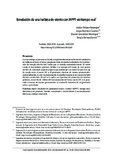Machine-Learning-Assisted Transmission Power Control for LoRaWAN Considering Environments with High Signal-to-Noise Variation

Compartir este ítem
Fecha
2024Autor
Gonzalez-Palacio M
Tobon-Vallejo D
Sepulveda-Cano L.M
Luna-delRisco M
Roehrig C
Le L.B.
Citación
Metadatos
Mostrar el registro completo del ítemResumen
To achieve an adequate tradeoff between range and energy efficiency, LoRaWAN End Nodes (ENs) choose their transmission parameters using an Adaptive Data Rate (ADR) scheme based on the maximum value of previous Signal-to-Noise (<italic>SNR</italic>) values. However, the ADR only performs well in favorable channel conditions. In fact, if the <italic>SNR</italic> exhibits high variability, these parameters could be inefficiently set and may negatively affect the Packet Delivery Rate (PDR). Therefore, a link margin could be overestimated to improve the PDR by the ADR algorithm, which may, however, waste the EN’s energy. This paper proposes a novel ADR that does not rely on the past <italic>SNR</italic> values. Still, our proposed design directly predicts the current <italic>SNR</italic> and transmission parameters using Machine Learning. Specifically, the underlying Machine Learning models were trained using in-field measurements for six months in Medellín, Colombia, including different environmental variables and their effects on the <italic>SNR</italic>. Our ADR scheme improved energy consumption by 47.1% with a PDR of 99% and reduced collisions in dense networks up to 9.5% compared with the ADR scheme. Furthermore, we show that our proposed design outperforms some enhanced versions of the ADR scheme proposed in the literature in both energy consumption and collision rate. Finally, our proposed framework enables simple implementation since it runs directly in the ENs, improving the response time compared with the traditional ADR scheme. Authors
Colecciones
- Indexados Scopus [1813]
Ítems relacionados
Mostrando ítems relacionados por Título, Autor o Palabra clave.
-
Facultades extraordinarias del presidente de la república en Colombia
Betancur Hincapié, Guillermo León (Universidad de Medellín. Facultad de DerechoMaestría en DerechoMedellín, 2016-12-01)Referirse a las facultades extraordinarias del Presidente de la República en Colombia, es hacer alusión a aquellos poderes, aptitudes o atribuciones precisas que por fuera o más allá de lo común, y previa solicitud expresa ... -
Optimization of affine dynamic systems evolving with state suprema: New perspectives in maximum power point tracking control
Azhmyakov V.; Vemest E.I.; Trujillo L.A.G.; Valenzuela P.A. (Institute of Electrical and Electronics Engineers Inc.Ciencias BásicasFacultad de Ciencias Básicas, 2018)This paper studies optimization of dynamic systems described by affine Functional Differential Equations (FDEs) involving a sup-operator. We deal with a class of FDEs-featured Optimal Control Problems (OCPs) in the presence ... -
Emulación de una turbina de viento con MPPT en tiempo real
Peláez-Restrepo, Julián; Herrera-Cuartas, Jorge Aurelio; Gonzalez-Montoya, Daniel; Serna-Garces, Sergio Ignacio (Universidad de MedellínFacultad de IngenieríasMedellín, 2019-12-01)En este trabajo se presenta el diseño e implementación de un banco de emulación de turbinas eólicas; el banco propuesto tiene en cuenta la dinámica de la extracción de energía efectiva del viento que se modela matemáticamente. ...

